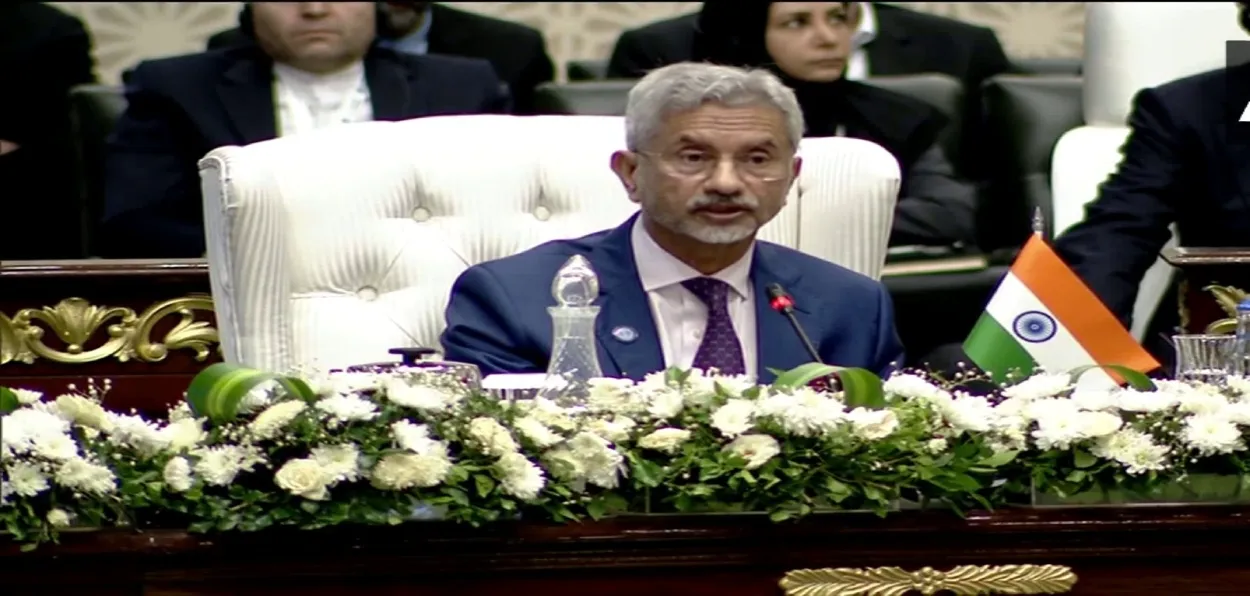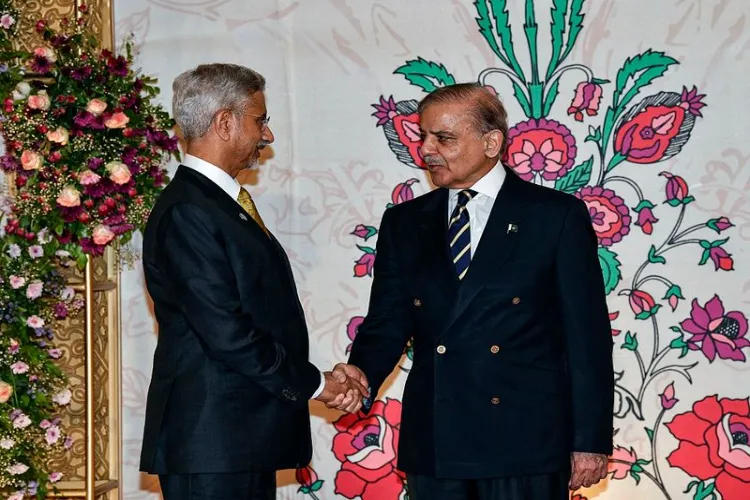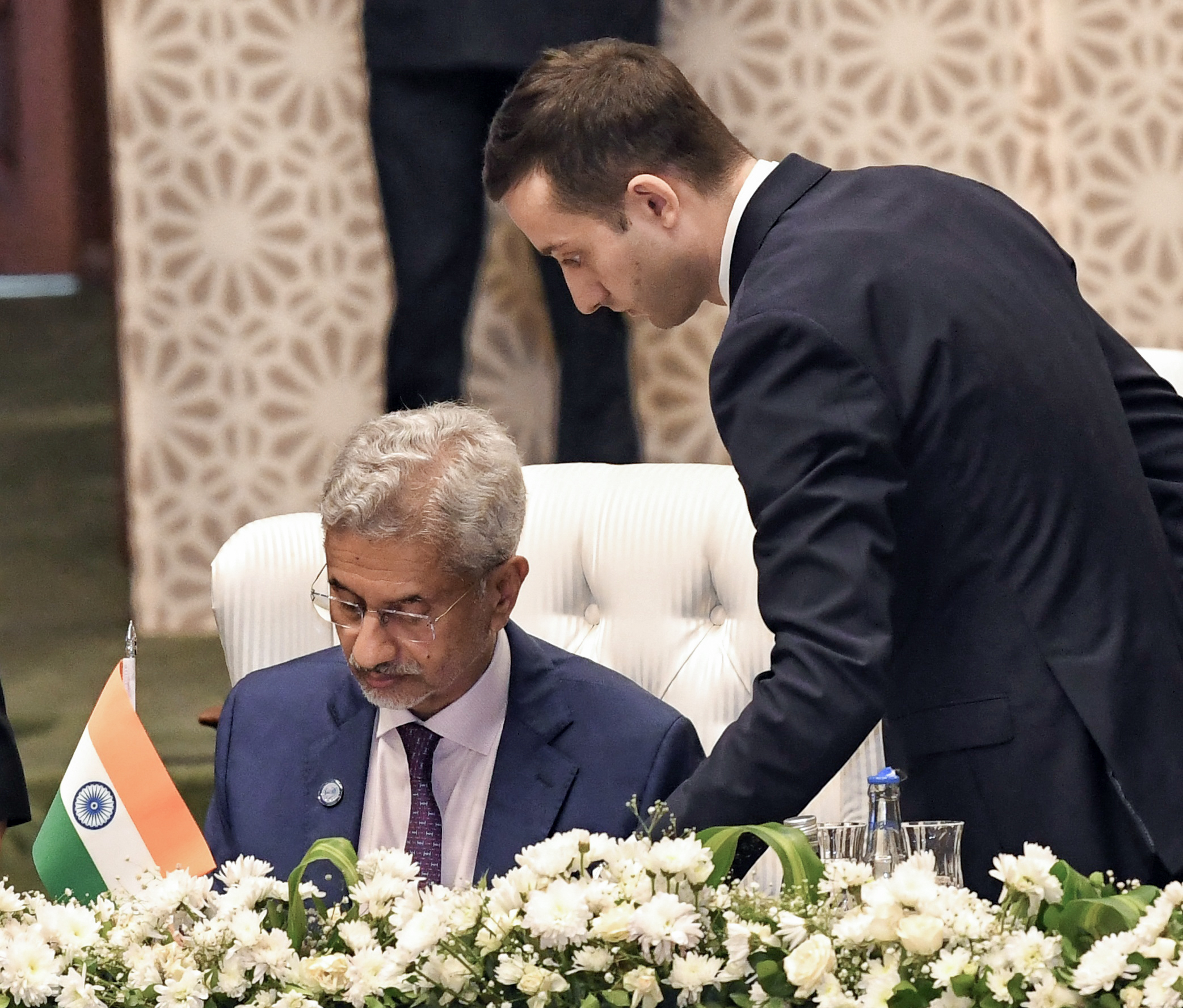
 Aditi Bhaduri
Aditi Bhaduri
External Affairs Minister S. Jaishankar 's visit to Islamabad to attend the Shanghai Cooperation Organisation summit of heads of governments, chaired by Pakistan, can now be said to have been successful - and successful at several levels.
First, traveling to Islamabad is hugely symbolic as it is the first such visit by an EAM in nine years, amid downgraded diplomatic relations between the two countries. In Islamabad, he was warmly greeted by and shook hands with Prime Minister Shehbaz Sharif, in a departure from the polite but stiff namaste he had offered then Pakistan’s foreign minister Bilawal Bhutto during the SCO foreign ministers’ meet in Goa last year.
While no bilateral meetings took place between the two sides, at the end of the summit Jaishankar warmly thanked his hosts. "Departing from Islamabad. Thank PM @CMShehbaz, DPM & FM @MIshaqDar50 and the Government of Pakistan for the hospitality and courtesies," he wrote.
Departing from Islamabad. Thank PM @CMShehbaz, DPM & FM @MIshaqDar50 and the Government of Pakistan for the hospitality and courtesies. pic.twitter.com/wftT91yrKj
— Dr. S. Jaishankar (@DrSJaishankar) October 16, 2024
This can be interpreted as an icebreaker between the two countries, as bilateral relations remained strained since 2019. It also shows that India is ready for good neighbourliness, and the ball is in Pakistan’s court. In his address, he said, "If trust is lacking or cooperation inadequate if the friendship has fallen short and good neighbourliness is missing somewhere, there are surely reasons to introspect and causes to address." This is seen as a veiled message to both Pakistan and China.
Next, the visit demonstrates, and to India's benefit, that it remains committed to the SCO. Last year, when India was the SCO chair, and while expending sufficient effort for it, its preoccupation with G20 required it to call for a virtual summit. This did not go well with the Central Asian countries, the founding members of the SCO.
Earlier this year, when Kazakhstan was chair, once again it was Jaishankar, and not Prime Minister Narendra Modi, who attended the summit, though every other head of state, including Chinese President Xi Jinping, Russian President Vladimir Putin, Uzbek President Shavkat Mirziyoyev, had been present. This too had caused some consternation among member states about India's engagement with the SCO.
 Dr S Jaishankar with Pakistan PM Shehbaz Sharif in Islamabad
Dr S Jaishankar with Pakistan PM Shehbaz Sharif in Islamabad
Third, India also managed to put forth its concerns regarding regional security, cross-border terrorism, and respect for the territorial integrity and sovereignty of nations. "If activities across borders are characterised by terrorism, extremism, and separatism, they are hardly likely to encourage trade, energy flows, connectivity and people-to-people exchanges in parallel," Jaishankar said in his address at the summit.
The SCO was originally conceived as an organization for regional peace, security, and stability. The organization was established in 2001, in the aftermath of the war on terror in Afghanistan. Since instability in Afghanistan had affected all five central Asian countries, three of whom have direct borders with it, as well as China and Russia, it became imperative to collectively take steps to counter radicalism, extremism, and separatism. The original members were China, Russia, Kazakhstan, Kyrgyzstan, Tajikistan, and Uzbekistan.
It also came in the wake of an expanding Chinese footprint in Central Asia, a region traditionally lying in Russia’s sphere of influence. The SCO ensured a balance of power in the region, with Russia maintaining defence and security presence, and China taking care of economic activities. India and Pakistan joined in 2017. Russia facilitated India's entry into the organisation, and China facilitated Pakistan’s entry. Iran became a member in 2023 and Belarus joined it this year.
Since India remains concerned with increasing Chinese presence in South Asia, it needs to be active in groupings with China on board. India doesn't want to cede it any undue advantage.
Dr S Jaishankar taking a morning walk with staff of the Indian High Commission in Islamabad
Currently, the SCO has eleven member-states: India, Iran, Kazakhstan, Kyrgyzstan, China, Pakistan, Russia, Tajikistan, and Uzbekistan. It has two Observer states: Afghanistan and Mongolia, and 14 Dialogue Partners – Azerbaijan, Armenia, Bahrain, Egypt, Cambodia, Qatar, Kuwait, Maldives, Myanmar, Nepal, the United Arab Emirates, Saudi Arabia,, Turkey, Sri Lanka. It will surely see further expansion shortly.
The SCO has often been called the Eastern NATO, but unlike NATO it has no military alliance. The organization's main objective is maintaining regional peace and security, promoting trade and investments, and ensuring connectivity. While China has used the organisation to step up its ambitious Belt and Road Initiative (BRI), India is the 9nlt member-state that has not signed on to it, as it sees the China-Pakistan Economic Corridor (CPEC), a flagship BRI project, that passes through Pakistan occupied Kashmir, as a violation of its territorial integrity.
 Dr S Jaishankar signing the final declaration at the SCO summit in islamabad
Dr S Jaishankar signing the final declaration at the SCO summit in islamabad
Meanwhile, the Central Asian countries, which are all landlocked, seek connectivity and trade routes across the region to the warm waters of the Indian Ocean. As do China and Russia Thus the SCO also offers a good platform for engaging on these issues as connectivity would also serve India well as it would become easier to access both the goods and the markets of Central Asia.
In this regard, another major raising d'etre for India's membership in the SCO was to more actively and frequently engage with the Central Asian countries: Kazakhstan, Kyrgyzstan, Tajikistan, and Uzbekistan. Therefore, membership of the SCO serves India well and Jaishankar 's visit to Islamabad will allay other members about its commitment.
The recent terror attacks in Pakistan, targeting Chinese citizens in particular are a reminder and a warning to the SCO of the havoc that terrorism and opaque transnational projects like the BRI can cause.
Afghanistan remains another regional concern. With the Taliban ensconced in Kabul and groups like the ISIS-KP and Al Qaeda remaining active there to deal effectively with these problems requires a collective mechanism. The SCO, no matter its drawbacks, remains the ideal platform for this.
ALSO READ: Has PM Modi's Kyiv visit placed India in peace broker's seat in Russia-Ukraine conflict?
These are the reasons that a host of other countries in the Eurasian region seek to join it and its expansion in the near future is certain. This is why India needs to remain active in and engaged with the organization and the reason why Jaishankar 's participation in the SCO conclave in Islamabad was necessary and important.
